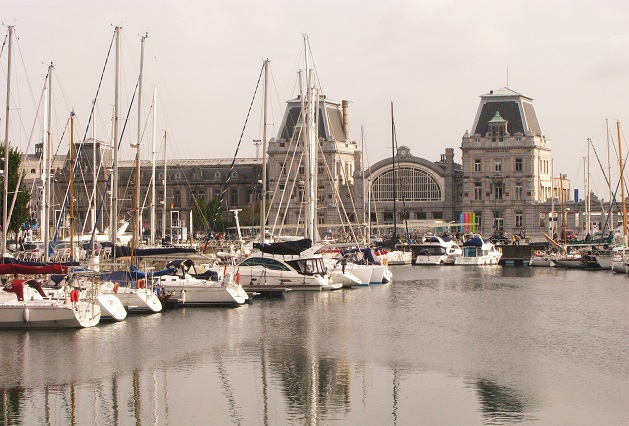Christians in Belgium seek real conversations about prostitution as ‘hangar d’amour’ is announced
The Belgian city of Ostend will convert an abandoned hangar into a brothel. “Many prostitutes think they are protected, but they are not”, says a Christian social worker in the region.
ANTWERP · 26 JUNE 2018 · 16:45 CET

Last week the municipality of Ostend granted permission to a project developer to convert an abandoned hangar in the port of the city into a brothel.
Mayor Johan Vande Lannotte defends the decision by stating this will improve the situation of the prostitutes and abuses will be limited. He also denies the building will become a ‘mega-brothel’, since the complex will also house appartments, offices and a brewery. Local action groups regret the decision – they had hoped the building would be converted into a maritime museum.
Prostitution is legal in Belgium as long as the people involved are aged over 18. Promoting sexual services - including pimping – is forbidden. At least in theory, for in practice most activities are tolerated.
There are no official statistics, but is estimated that between 20.000 and 30.000 people are involved in the Belgian sex industry. Especially in the last decades there has been a strong increase of sex workers, mainly due to human trafficking. By controlling prostitution, the government hopes to limit the influx of (foreign) prostitutes.
THE EXAMPLE OF ANTWERP
The plans for transforming the former building in a ‘hangar d’amour’ are mainly based on the example of the city of Antwerp. About fifteen years ago, the municipality of that city reorganised the (visible) prostitution in the city, by limiting the ‘red ligth district’ from 17 to 3 streets, just outside the centre.
One building, called Villa Tinto, serves as a ‘mega-brothel’. A nightclub in a neighbouring building recently applied for a permission to transform its building into a large brothel too. In order to exclude pimping, rooms in the brothels are only rented out directly to the women.
The prostitution area of Antwerp is promoted by officials as an example of safe prostitution. However, although officialy denied, there is an immense problem of women trafficked from (mainly) Eastern Europe and forced into prostitution.
“SOLUTIONS” TO THE PROSTITUTION PROBLEM
The idea of converting the hangar in Ostend into a brothel was first discussed in November 2017, when the council of the city decided to move the actual prostitution activities from the ‘Hazegras’ area – which is also a residential district – to a new location, about half a mile away.
It is questionable whether this can be really considered as a relocation – prostitution in Hazegras-neighbourhood has been declining over the years and there only 8 establishments left, far less than the places available in the new building. However, mayor Vande Lannotte, who is also a high-ranking politician of the Socialist Party, visited Antwerp and was enthousiastic about the situation there. He considered it to be the right solution to the ‘prostitution-problems’ in Ostend.
Local authorities are usually reluctant to ban prostitution and prefer to have control by regulating the situation. Of course, when prostitution is ‘official’, buildings and activities can be taxed, which make them profitable for the financial situation of the city. It also creates a better image.
The fact that being a prostitute can be a great risk, was recently demonstrated by the news that a Nigerian prostitute In Brussels was killed by a 17 year old boy – apparently because of a problem concerning the payment. Brussels has no ‘mega brothel’, but window prostitution is mainly concentrated in the North Station area (as commuters can see every day).
NORMAL AND ACCEPTABLE?
Local Christians in Ostend think the plans for the hangar will lead to an increase of prostitution and they are afraid it will become a ‘tourist attraction’. Nevertheless they emphasize that there should be no emotional overreaction. “There has been a problem of prostitution in Ostend for a long time, and the actual situation is sensationalised”. They regret that prostitution is more and more accepted: “We are often told that we should consider prostitution as being normal and acceptable. As Christians we should take time to reflect on the situation, to investigate the problem and to take time to pray to the Lord for knowledge and wisdom how te react. Finding the right time to react is crucial”.
INDIFFERENCE OF THE MAJORITY OF BELGIANS
In general, prostitution in Belgium is socially accepted. Or should we say: most people are indifferent. People know that prostitution exists but do not really care. Few people are aware of the human trafficking problem.

She works in the Antwerp red light district on a daily basis and has many contacts with the girls behind the window. She concludes that in spite of all new regulations, the situation has not much improved in the last decades. The total number of prostitutes did not decline – the sex industry is only concentrated in a smaller area than before.
The mega-brothel ‘Villa Tinto’ is supposed to offer a better protection, but in practice, not much of that can be seen: “The police has a room in the building, but seldom there is an officer present. In general, women are afraid to report abuses to the police. The fact that the women hire their room directly from the owner, does not mean there is no pimping. Many prostitutes have an alarm-button in their working space, but not all of these are connected: it is a service that pimps have to pay a fee for, and often they don’t. Many prostitutes think they are protected, but they are not”.
Johanneke’s experience confirms that about 80 percent of the women involved in prostitution are victims of human trafficking.
“We seldom encounter prostitutes who voluntarily entered the ‘profession’. In many cases they are forced, whether by circumstances or by traffickers”.
She is not positive about the plans in Ostend, and is a bit disappointed in the fact that so few Christians protest against these kind of initiatives. Many believers in Belgium ignore the problem, like the rest of the population. There is an urgent need of more awareness of the situation.
WHY SHOULD CHRISTIANS OPPOSE PROSTITUTION?
Are Christians especially opposed to prostitution? In the first place, this is a matter of human values and women’s rights. Women should not be exploited and sexuality should not be commercialised.
But in addition, Christians have the Biblical values and the conviction that sex is God-given, within the framework of marriage.
Unfortunately, in spite of this, prostitution did exist in Biblical times. Nowadays the role of Christians can be showing the high standard of love and sexuality as presented in the Bible. Christians can make the difference in society by showing God’s love to the prostitutes and by helping them to escape from their slavery. The right time to react might be right now.
Published in: Evangelical Focus - cities - Christians in Belgium seek real conversations about prostitution as ‘hangar d’amour’ is announced
